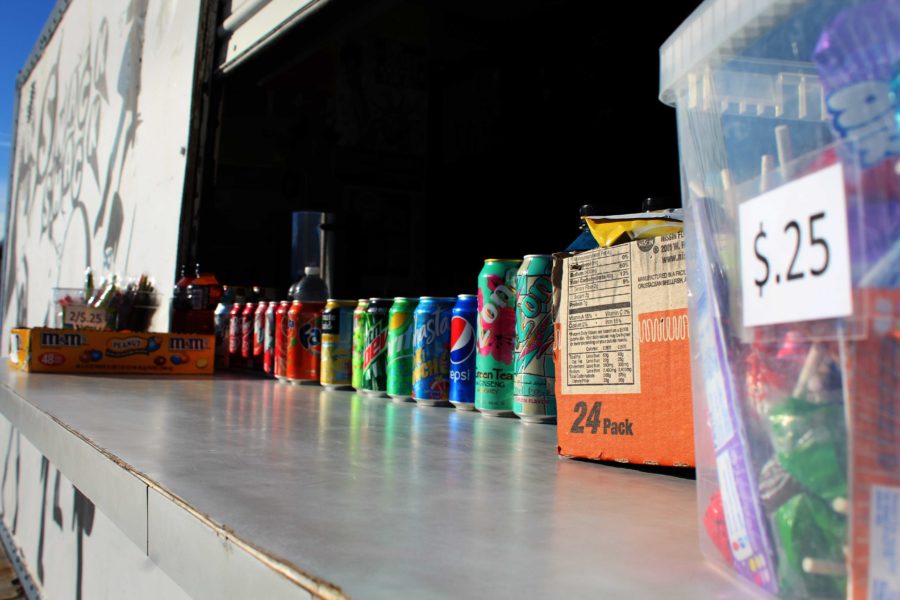Controversy surrounds alleged musical monopoly
Sodas sold for $1 line the snack shack, run by the ACHS Music Boosters as a fundraiser for the music program.
Every day after school, many students purchase food and drinks from a cart in front of the A building or the ‘snack shack’ next to the ASB room. Both of these venues are owned by band, leading to controversy regarding the band programs exclusive right to after school sales of food over the past few years.
Food sales during school time are currently forbidden because it is against the law for nonsanctioned food vendors to compete with the cafeteria, and under Education Code 49431.2, only certain consumables may be sold on campus. These restrictions led to the creation of the “after school program” for band.
“I believe band was originally able to sell food at nutrition, lunch, and after school. And then, food service said no more [food selling] during the day. So band’s new fundraiser became the after school sales, and band had it exclusively,” said Mrs. Julie Riedmiller, former ASB director. According to her, Mr. John Stava, former band director, and Mr. Glenn Lipman, former principal, set up the policy in a meeting that only they attended. At the time, no other clubs objected to the policy.
Today, many clubs feel that this policy is unfair for others that have a common interest in raising funds after school.
Mrs. Colleen Colborn, CSF adviser, had planned a fundraiser that was cancelled due to the food sale policy last year. “From my understanding, our fundraiser was cancelled because band has to raise a large sum of money, so they were given priority,” she said. “Their fundraising goal is much higher than us, so I understand why. But at the same time, it would nice if there were some ways, some happy medium, so we can have our fundraising events on campus, to provide an on-campus access for our club. That’s the main thing.”
The booster for the music program has historically required over $100,000 each year in order to cover the cost for expenses such as replenishing and repairing musical instruments, hosting events, and transportation, according to Mr. Daniel Cook, the new band teacher and director.
Iris Shim, KIWIN’S club president, said that though she understands that band needs to raise a large amount of money, other clubs also need the chance to do so. She believes that KIWIN’S works for multiple different goals and should be granted with the same opportunity to raise money for charity as well. “[The rule] is slightly upsetting, because KIWIN’S aims to save lives by fundraising for things like Project Eliminate and Pediatric Trauma Program, which saves the lives of children and mothers around the world,” said Shim. “I think that those causes are just as important as our music program.”
CSF president Kayla Kotake presents a similar situation. “Every club needs money, and everybody is trying to do the best they can with what they can make. But the after school sales and before school sales are big opportunities for everyone to sell. And just because it goes to one organization, I feel like that’s difficult, because everyone is trying to do the same thing.”
Cook said that a few advisers from different clubs, organizations, and athletic groups have contacted regarding the policy and its flexibility, leading the program to try and provide other clubs with some opportunities. “This year, we did give concessions. We gave up minimum days and final days for other clubs to take advantages of. We are always entrusted in allowing other clubs that fair shake,” he said.
“Is [the current policy] equitable for everyone? I would argue that no, it is not equitable for everyone,” Cook said. “As a new teacher here, I think the conversation got started very late for us to have any changes happening now. The reason for that is, our booster budget was set with the expectation of what we were already okay for. Our administration already approved what is in existence now.”
The band’s daily gross income from after school food sales range from $40 to $100, depending on the weather.
Dr. Kim Stephenson, principal, hopes for further discussion and coordination with other clubs advisers who have their voices wanted to be heard. She does support further growth for band. “We have had meetings with band and activities directors, and we are thinking about alternatives [other than fundraisers after school for band],” she said. “Band has already been budgeted for this year.”
Current ASB director Ms. Lori Pristera declined to comment until she attends a meeting for discussion of possible future policy changes, which is planned for May.
Kristi Chu contributed to this story.

Hello everybody, I am Chun-Tzu Huang, a senior, and it is my second year on the Stinger staff. I am a lover of creative writing and a bit of a writing...

















































































![Senior Ditch Day... Relaxation or Truancy? [Video]](https://achsstinger.com/wp-content/uploads/2017/10/IMG_7119-900x599.jpg)
![Heavy Rain Hits Cam High [video]](https://achsstinger.com/wp-content/uploads/2017/02/maxresdefault-900x506.jpg)




Max • Feb 11, 2016 at 1:25 pm
If the snack shack goes, there will be no more marching band. It’s as simple as that.
Priorities • Feb 10, 2016 at 4:12 pm
Although there is much controversy on this subject, I believe the band deserves most of the after school sales. They must raise over $100,000, a great deal of which is covered by fundraisers. The biggest fundraiser is always snack shack, and without the sales, they would not be able to pay for the budget they need. This helps students pay only $400-$600 a semester (depending on what band programs they join), which is already a large amount. They do many other fundraisers as well, but snack shack reels in the most money. The band program already does not get a big budget like other programs at the school. Other bands get so much money from their district that they are able to do bigger and better shows. But we, at Camarillo high school, must find a way to raise most of our own money. Selling food after school on regular days should belong only to band, as they need it the most and are an actual class and competitive team representing Camarillo at many events.